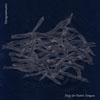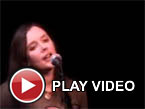Tetragrammaton, "Elegy for Native Tongues"
 Having collaborated with the likes of Damo Suzuki and members of Zeni Geva and Acid Mother’s Temple, it’s not surprising at all that this is going to be a loud and “out there” sort of project. And it is, traipsing the line between free jazz and noise with reckless abandon. Never leaning fully onto one side or the other, it makes for an interesting dichotomy throughout both studio and live discs.
Having collaborated with the likes of Damo Suzuki and members of Zeni Geva and Acid Mother’s Temple, it’s not surprising at all that this is going to be a loud and “out there” sort of project. And it is, traipsing the line between free jazz and noise with reckless abandon. Never leaning fully onto one side or the other, it makes for an interesting dichotomy throughout both studio and live discs.
Distinguishing them between "live" and "studio" is probably a fruitless endeavor, since the studio work was a four track cassette recording that almost certainly wasn’t the product of pro-tools tweaks and multitracking. However, the two do differ in sense of structure and style, and thus are not redundant in any sense of the word.
Studio disc opener "The Ghosts Won't Starve but We Will Perish" has some traditional jazz drumming with odd chaotic percussive elements, and subtle, restrained horns. Rapid hurdy gurdy and pained horns add to the slow build of chaos. The interplay of instrumentation gets more and more chaotic, dropping out to allow for more electronic instrumentation towards the end.
The shorter "Elegy for Native Tongues" eschews subtle tension for saxophone freak outs and guitar noodling, with shorter rattling drums and stunted guitar playing, ending with blasts of pure electronic noise. "Queen of the Ships" amps up the drums to be more forceful and violent, overshadowing buried guitar chords and standing toe to toe with thick walls of dissonant horn, the sludgy guitar eventually pulling ahead in volume to go with the spastic jazz drumming.
The live disc opens with the more traditional sounds of "Oresteia in One Part," at least in the case of the horns, though the mechanical noises and ominous swells are anything but conventional, and the piece slowly transitions into a more rock framework. "Solve et Coagula" turns up the noise knob a bit, adding more electronics to the stuttering hurdy gurdy that explodes into harsh free jazz akin to the likes of Peter Brotzmann.
Interestingly, both discs close with pieces that are more restrained, at least relatively speaking. "Santa Sangre" places funereal horns over electronic drones that feels more mournful, though still adding in a tiny bit of chaos. The last live track, "Los Heraldos Negros," varies the tempo throughout and still speeds up at the end, but even with the abrasive guitar it remains more relaxed than the previous two.
This set manages to capture the best elements of the esoteric world of "free music" without succumbing to the subgenre's tendency to become simply a catalog of random sounds without much focus. Instead it keeps the free jazz propulsion and a bit of good ol' rock & roll to keep it on track.
samples:



